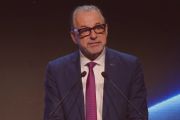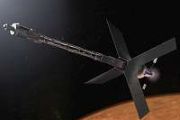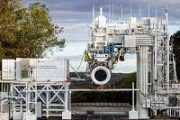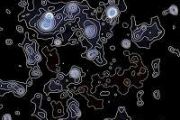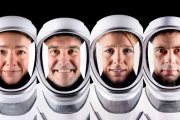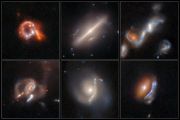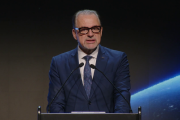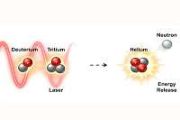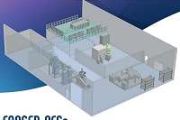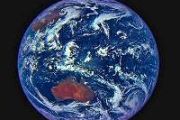
Copernical Team
Flat, pancake-sized metalens images lunar surface in an engineering first
 Astronomers and amateurs alike know the bigger the telescope, the more powerful the imaging capability. To keep the power but streamline one of the bulkier components, a Penn State-led research team created the first ultrathin, compact metalens telescope capable of imaging far-away objects, including the moon.
Metalenses comprise tiny, antenna-like surface patterns that can focus light to
Astronomers and amateurs alike know the bigger the telescope, the more powerful the imaging capability. To keep the power but streamline one of the bulkier components, a Penn State-led research team created the first ultrathin, compact metalens telescope capable of imaging far-away objects, including the moon.
Metalenses comprise tiny, antenna-like surface patterns that can focus light to SpaceX CRS-27 delivers truck load of research projects to ISS
 NASA's 27th SpaceX commercial resupply services (CRS) mission is scheduled to launch to the International Space Station from the agency's Kennedy Space Center in Florida in March. The scientific experiments and technology demonstrations carried by the uncrewed Dragon spacecraft examine how the heart changes in space, test a student-designed camera mount, compare surfaces that control biofilm for
NASA's 27th SpaceX commercial resupply services (CRS) mission is scheduled to launch to the International Space Station from the agency's Kennedy Space Center in Florida in March. The scientific experiments and technology demonstrations carried by the uncrewed Dragon spacecraft examine how the heart changes in space, test a student-designed camera mount, compare surfaces that control biofilm for Japan's new H3 rocket fails to reach orbit, self-destruct command issued
 On Tuesday, Japan's next-generation H3 rocket failed after liftoff, prompting the space agency to issue a destruct command after concluding that the mission could not be completed.
The H3 successfully launched after a failed attempt last month when the vehicle's two solid rocket boosters failed to ignite as planned, and aborted right at liftoff.
Mitsubishi Heavy Industries (MHI) laun
On Tuesday, Japan's next-generation H3 rocket failed after liftoff, prompting the space agency to issue a destruct command after concluding that the mission could not be completed.
The H3 successfully launched after a failed attempt last month when the vehicle's two solid rocket boosters failed to ignite as planned, and aborted right at liftoff.
Mitsubishi Heavy Industries (MHI) laun Virgin Galactic to renew Spaceplane Flights
 Virgin Galactic has completed improvements to its VSS Unity spaceplane. The company plans to restart a passenger flight program this year, the company said Tuesday.
Virgin Galactic suspended flights of the Unity and its carrier plane, the VMS Eve, in 2021 to work on the craft. The VSS Unity launches from the surface of the Eve after that plane carries the spacecraft up.
Virgin Galact
Virgin Galactic has completed improvements to its VSS Unity spaceplane. The company plans to restart a passenger flight program this year, the company said Tuesday.
Virgin Galactic suspended flights of the Unity and its carrier plane, the VMS Eve, in 2021 to work on the craft. The VSS Unity launches from the surface of the Eve after that plane carries the spacecraft up.
Virgin Galact Working together to make a difference
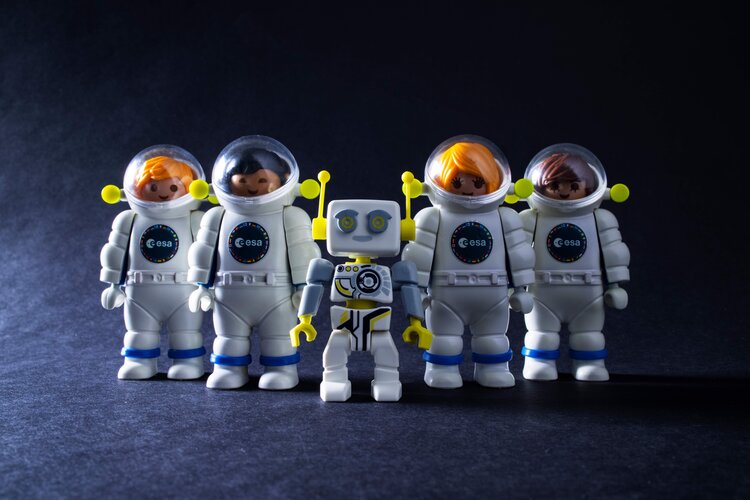
A partnership between ESA and PLAYMOBIL continues to inspire and educate children about space. It also helps to support the children’s humanitarian organisation UNICEF and its work with vulnerable children around the world.
Japan H3 rocket fails, destruct command issued
 Japan's next-generation H3 rocket failed after liftoff on Tuesday, with the space agency issuing a destruct command after concluding the mission could not succeed.
The failure is a blow for Japan's space agency JAXA, after the rocket failed to even lift off on its first try last month.
Tuesday's launch from the Tanegashima Space Center in southwestern Japan initially appeared to be a su
Japan's next-generation H3 rocket failed after liftoff on Tuesday, with the space agency issuing a destruct command after concluding the mission could not succeed.
The failure is a blow for Japan's space agency JAXA, after the rocket failed to even lift off on its first try last month.
Tuesday's launch from the Tanegashima Space Center in southwestern Japan initially appeared to be a su Climate change is launching a mutant seed space race

Hurtling around the Earth at more than 20 times the speed of sound, some of the tiniest life forms aboard the International Space Station are on a mission to feed people on a warming planet.
Seeds of sorghum and cress launched into orbit by the International Atomic Energy Agency are tethered to the capsule via a thin metal box. That's exposing them to more-intense solar radiation in a trial to induce genetic mutations so they can survive hotter temperatures, drier soils, spreading pestilence and rising sea levels.
"Most astrobotany until now has been to test how plants can be grown to feed astronauts for eventual space colonies," Shoba Sivasankar, the IAEA's head of genetics and plant breeding, said at her lab outside Vienna. "This experiment is different because it is designed to help people on Earth adapt to climate change."
Farmers from Argentina to California, France and India are struggling to maintain yields amid global warming, with rising prices for the key crops used to bake bread weighing on political stability. Drought gripping North Africa is curbing local wheat harvests, potentially boosting demand in one of the world's top import regions.
NASA's Curiosity views first 'sun rays' on Mars
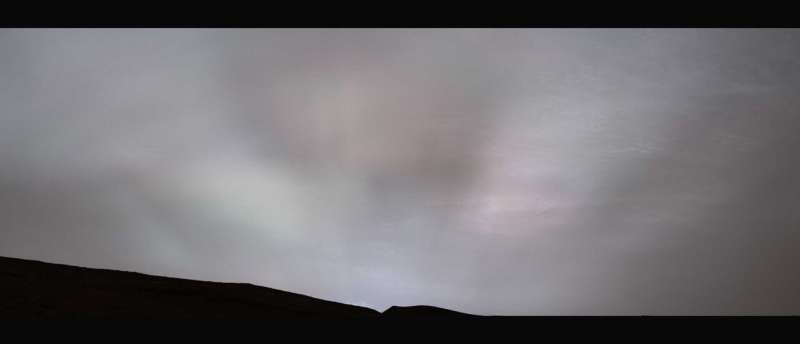
Martian sunsets are uniquely moody, but NASA's Curiosity rover captured one last month that stands out. As the sun descended over the horizon on Feb. 2, rays of light illuminated a bank of clouds. These "sun rays" are also known as crepuscular rays, from the Latin word for "twilight.
HydroGNSS twice as good
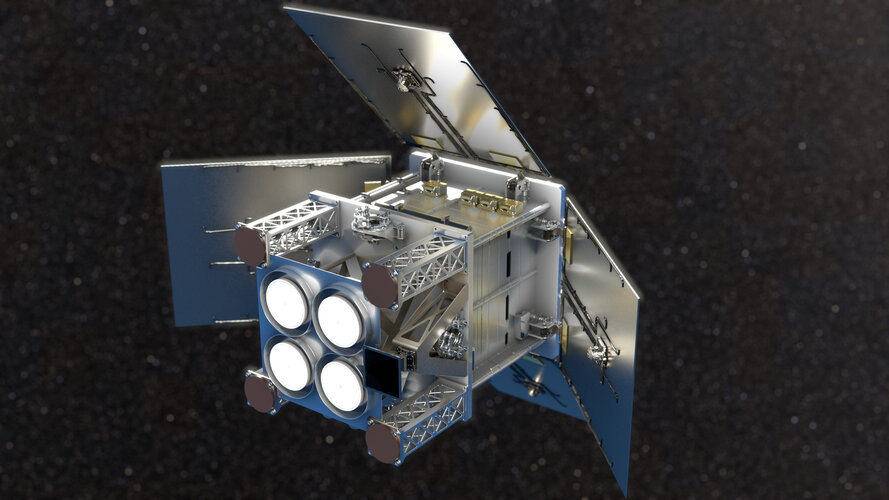
ESA’s HydroGNSS mission will now comprise two identical satellites to halve the time it takes to revisit the same place on Earth’s surface and re-measure various climate variables such soil moisture. Having two satellites in orbit will significantly improve the science that this exciting new Scout mission will yield.
AI draws most accurate map of star birthplaces in the Galaxy
 Stars are formed by molecular gas and dust coalescing in space. These molecular gases are so dilute and cold that they are invisible to the human eye, but they do emit faint radio waves that can be observed by radio telescopes.
Observing from Earth, a lot of matter lies ahead and behind these molecular clouds and these overlapping features make it difficult to determine their distance and
Stars are formed by molecular gas and dust coalescing in space. These molecular gases are so dilute and cold that they are invisible to the human eye, but they do emit faint radio waves that can be observed by radio telescopes.
Observing from Earth, a lot of matter lies ahead and behind these molecular clouds and these overlapping features make it difficult to determine their distance and 





